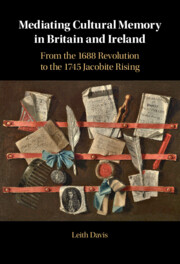 Mediating Cultural Memory in Britain and Ireland
Mediating Cultural Memory in Britain and Ireland Book contents
- Mediating Cultural Memory in Britain and Ireland
- Mediating Cultural Memory in Britain and Ireland
- Copyright page
- Contents
- Figures
- Acknowledgments
- Introduction
- Chapter 1 Of Documents and Declarations
- Chapter 2 Remembering to Forget
- Chapter 3 National Correspondences
- Chapter 4 Writing the 1715 Jacobite Rising
- Chapter 5 Reading the 1745 Jacobite Rising
- Conclusion
- Bibliography
- Index
Chapter 1 - Of Documents and Declarations
Mediating the 1688 Revolution
Published online by Cambridge University Press: 10 March 2022
- Mediating Cultural Memory in Britain and Ireland
- Mediating Cultural Memory in Britain and Ireland
- Copyright page
- Contents
- Figures
- Acknowledgments
- Introduction
- Chapter 1 Of Documents and Declarations
- Chapter 2 Remembering to Forget
- Chapter 3 National Correspondences
- Chapter 4 Writing the 1715 Jacobite Rising
- Chapter 5 Reading the 1745 Jacobite Rising
- Conclusion
- Bibliography
- Index
Summary
Chapter 1 begins by comparing Gilbert Burnet’s focus on the song “Liliburlero” as the media event of the 1688 Revolution with what contemporary scholars have written about the importance of printed works at the time. It asserts the importance of adopting a multi-media perspective on the 1688 Revolution. It analyzes James II/VII’s shifting use of media in the context of challenges to his throne by the Duke of Monmouth and the Earl of Argyll in 1685 and William of Orange in 1688. It assesses William’s Declaration outlining “the Reasons Inducing him, to Appear in Armes in the Kingdome of England” and suggests that the document gained its authority as a printed text by being represented in oral and manuscript forms. It concludes by suggesting that the initial mediation of the 1688 Revolution impacted its later re-inscription as a site of “Glorious” cultural memory when William’s Declaration was reprinted in early eighteenth-century histories of recent events such as those by Edmund Bohun and Abel Boyer.
Keywords
Information
- Type
- Chapter
- Information
- Mediating Cultural Memory in Britain and IrelandFrom the 1688 Revolution to the 1745 Jacobite Rising, pp. 27 - 67Publisher: Cambridge University PressPrint publication year: 2022